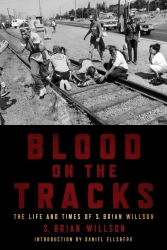Three Books in One: Staughton Lynd
This stunning and comprehensive memoir is three overlapping books in one.
First, there is a detailed narrative of major events in Brian Willson’s life. He grew up as an all-American boy in upstate New York and hoped to become an FBI agent. When drafted for service in Viet Nam he volunteered for the Air Force. Witnessing the indiscriminate bombing of Viet Nam villages changed his outlook forever, and led to his water-only fast against the Contra war in Nicaragua and the loss of his legs on the tracks at Concord Naval Station.
Next, there is Brian’s research-in-depth in societies victimized by United States imperialism. Along with scouring relevant histories, he went to Viet Nam, Nicaragua, El Salvador, Colombia, occupied Palestine, Ecuador, Brazil, Iraq, Cuba, and most hopefully, Chiapas, and talked at length with ordinary people. Everywhere he found two things: on the one hand, desperate poverty caused by multinational corporations headquartered in the United States and the effects of brutal American military intervention; on the other hand, remnants of an ancient way of life characterized by mutual aid and self-reliance in small communities, and connection with the natural world.
Finally, Brian Willson takes us with him on his spiritual journey. He asks us to recognize that Americans face an unprecedented choice between an ongoing, shameful narcissism in which we ravage the world and endanger humankind for the sake of material things, and a life grounded in horizontal rather than vertical relationships that is slower, smaller, more dignified, and in the end more satisfying.”
Staughton Lynd is a Quaker, conscientious objector, peace and civil rights activist, tax resister, historian, professor, author and lawyer who has made many significant contributions to social justice causes and the peace movement.
A Significant Chapter: Michael True
Brian Willson’s memoir adds a significant chapter to the history of nonviolence in the US, much of it buried under the rubble of war and imperial ambition. He dramatizes the power of peacemaking, through personal courage, intelligence, and generosity of spirit.
The remembrances of Gloria Emerson and Charlie Liteky provide a counter narrative to the history of domination and conquest imposed upon us in school and repeated in the popular media. In his gift to us, Willson reclaims stories often slighted or ignored by academic historians. He shows us that peace doesn’t just happen; it must be made through actions informed by love and determination.

